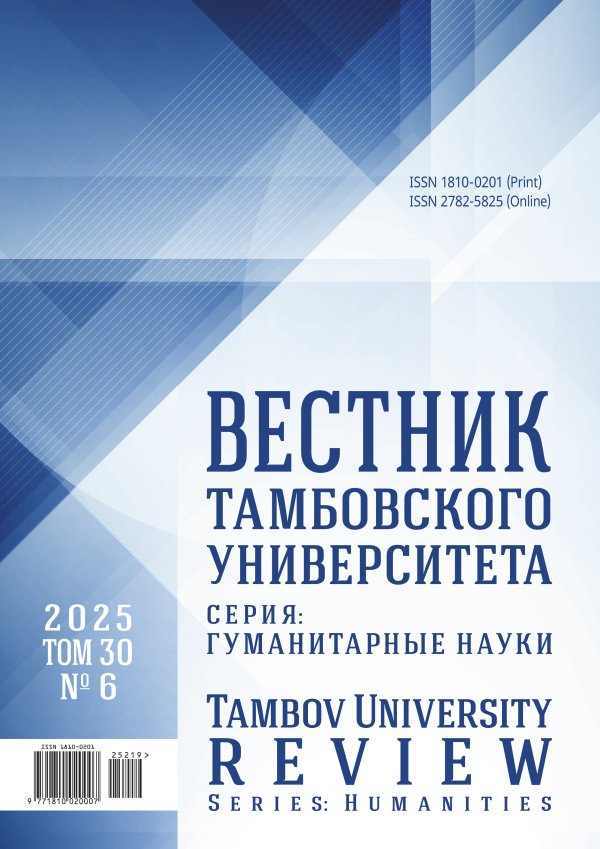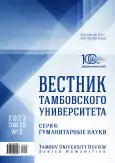Психолого-педагогические условия формирования коллокационной компетенции студентов на основе корпусных технологий
- Авторы: Клочихин В.В.1
-
Учреждения:
- ФГБОУ ВО «Тамбовский государственный университет им. Г.Р. Державина»
- Выпуск: Том 28, № 2 (2023)
- Страницы: 395-404
- Раздел: ТЕОРИЯ И МЕТОДИКА ОБУЧЕНИЯ ИНОСТРАННОМУ ЯЗЫКУ
- URL: https://bakhtiniada.ru/1810-0201/article/view/297994
- DOI: https://doi.org/10.20310/1810-0201-2023-28-2-395-404
- ID: 297994
Цитировать
Полный текст
Аннотация
Актуальность. Формирование коллокационной компетенции студентов лингвистических направлений подготовки выступает одной из основных целей обучения иностранному языку в вузе. Корпусные технологии являются одним из современных цифровых средств, с помощью которых возможна реализация данной цели. Однако в методике формирования коллокационной компетенции на основе корпусных технологий существует ряд проблемных зон, учет которых будет влиять на эффективность реализации данной методики обучения.Цель исследования – определить психолого-педагогические условия для эффективного формирования коллокационной компетенции на основе корпусных технологий.Методы исследования. На основе теоретического анализа научно-методической литературы и систематизации концептуальных подходов исследователей выявлены психологопедагогические условия, при помощи сопоставительного анализа и синтеза эмпирических данных теоретически обоснована эффективность учета психолого-педагогических условий для формирования коллокационной компетенции на основе корпусных технологий.Результаты исследования. Выявлены и обоснованы психолого-педагогические условия формирования коллокационной компетенции на основе корпусных технологий, которые необходимо учитывать при разработке методики обучения коллокациям. К таким условиям относятся: а) мотивация обучающихся развивать коллокационную компетенцию на основе корпусных технологий; б) сформированность ИКТ-компетенции у преподавателя иностранного языка; в) владение обучающимися иностранным языком на уровне B1; г) следование выделенным этапам проектной деятельности.Выводы. Формирование коллокационной компетенции на основе корпусных технологий должно осуществляться при соблюдении всего комплекса выявленных психологопедагогических условий. Полученные результаты могут быть использованы для повышения результативности методик обучения коллокациям на основе корпусных технологий.
Об авторах
В. В. Клочихин
ФГБОУ ВО «Тамбовский государственный университет им. Г.Р. Державина»
Автор, ответственный за переписку.
Email: cta124@yandex.ru
ORCID iD: 0000-0003-4845-6624
научный сотрудник лаборатории языкового поликультурного образования
392000, Российская Федерация, г. Тамбов, ул. Интернациональная, 33Список литературы
- Doley S.K. Stimulus appraisal-based L2 attitude and motivation among Indian ESL learners // International Journal of Instruction. 2023. Vol. 16. № 2. P. 603-622. https://doi.org/10.29333/iji.2023.16232a
- Dörnyei Z. Motivational Strategies in the Language Classroom. Cambridge: Cambridge University Press, 2001. 164 p. https://doi.org/10.1017/CBO9780511667343
- Тиунчик А.А., Кветко О.М. Влияние ИКТ на повышение мотивации студентов экономических специальностей к изучению математики // Формирование организационно-экономических условий эффективного функционирования АПК: сб. науч. cт. 13 Междунар. науч.-практ. конф. Минск: БГАТУ, 2021. С. 265-268. URL: https://rep.bsatu.by/handle/doc/13907 (дата обращения: 16.11.2022).
- Минасян Н.А. ИКТ как средство повышения мотивации учащихся на уроках иностранного языка // Концепт. 2017. № 58. С. 34-38. https://elibrary.ru/yizqav
- Zareva A. Incorporating corpus literacy skills into TESOL teacher training // ELT Journal. 2017. Vol. 71 (1). P. 69-79. https://doi.org/10.1093/elt/ccw045
- Мазаева Ю.А., Агавелян О.К. Содержание понятия «компьютерная грамотность» в научной литературе // Мир науки, культуры, образования. 2012. № 4 (35). С. 198-200. https://elibrary.ru/pcthyr
- Сысоев П.В., Евстигнеев М.Н. Компетентность преподавателя иностранного языка в области использования информационных и коммуникационных технологий // Язык и культура. 2014. № 1 (25). С. 160-167. https://elibrary.ru/rzrkup
- Hua T.K., Azmi N.A. Collocational competence as a measure of ESL/EFL competency: a scoping review // 3L: The Southeast Asian Journal of English Language Studies. 2021. Vol. 27. № 1. P. 115-128. http://dx.doi.org/10.17576/3L-2021-2701-09
- Siengsanoh B. Lexical collocational use by Thai EFL learners in writing // LEARN Journal: Language Education and Acquisition Research Network. 2021. Vol. 14. № 2. P. 171-193. URL: https://files.eric.ed.gov/fulltext/EJ1310912.pdf (дата обращения: 16.11.2022).
- Клочихин В.В. Формирование коллокационной компетенции обучающихся на основе электронного лингвистического корпуса // Вестник Тамбовского университета. Серия: Гуманитарные науки. 2019. Т. 24. № 179. С. 69-80. https://doi.org/10.20310/1810-0201-2019-24-179-69-80, https://elibrary.ru/yzesff
- Poole R. “Corpus can be tricky”: Revisiting teacher attitudes towards corpus-aided language learning and teaching // Computer Assisted Language Learning. 2022. Vol. 35. № 7. P. 1620-1641. https://doi.org/10.1080/09588221.2020.1825095
- O’Keeffe A., Mark G. Principled pattern curation to guide data-driven learning design // Applied Corpus Linguistics. 2022. Vol. 2. № 3. P. 1-15. https://doi.org/10.1016/j.acorp.2022.100028
- Сысоев П.В., Клочихин В.В. Формирование коллокационной компетенции на основе корпусных технологий // Перспективы науки и образования. 2022. № 4 (58). С. 320-335. https://doi.org/10.32744/pse.2022.4.19, https://elibrary.ru/oehvyx
- Клочихин В.В. Этапы формирования коллокационной компетенции студентов на основе лингвистического корпуса // Вестник Тамбовского университета. Серия: Гуманитарные науки. Тамбов, 2020. Т. 25. № 186. С. 14-24. https://doi.org/10.20310/1810-0201-2020-25-186-14-24, https://elibrary.ru/mqddog
- Li S. Using corpora to develop learners’ collocational competence // Language Learning and Technology. 2017. Vol. 21. № 3. P. 153-171. https://doi.org/10125/44625
- Сысоев П.В., Золотов П.Ю. Формирование прагматической компетенции студентов на основе корпусных технологий // Язык и культура. 2020. № 51. С. 229-246. https://doi.org/10.17223/19996195/51/12, https://elibrary.ru/qmhhsr
- Сысоев П.В., Токмакова Ю.В. Разработка методики предметно-языкового интегрированного обучения студентов аграрного вуза // Перспективы науки и образования. 2022. № 1 (55). С. 221-235. https://doi.org/10.32744/pse.2022.1.14, https://elibrary.ru/edzmxp
- Сысоев П.В., Семич Ю.И. Обучение студентов направления подготовки «Журналистика» иноязычному письменному высказыванию на основе корпусных технологий // Язык и культура. 2019. № 47. С. 260-276. https://doi.org/10.17223/19996195/47/15, https://elibrary.ru/xkvery
Дополнительные файлы










